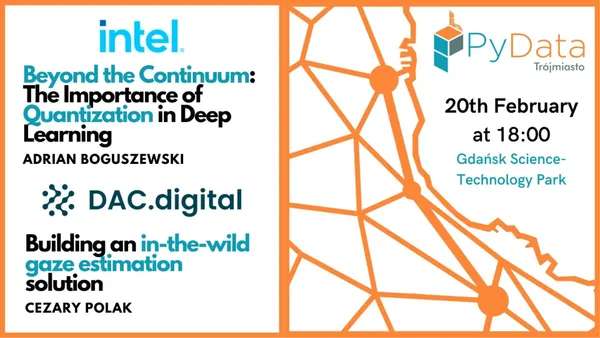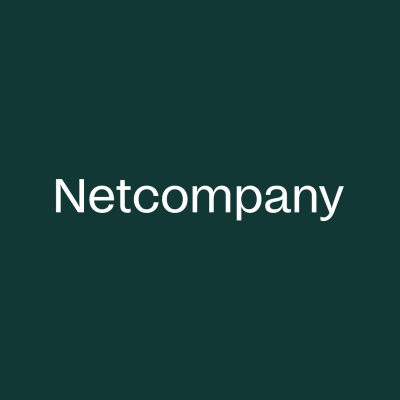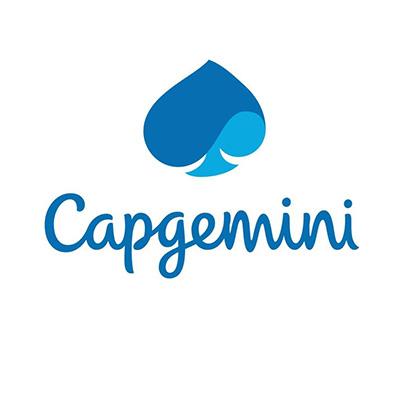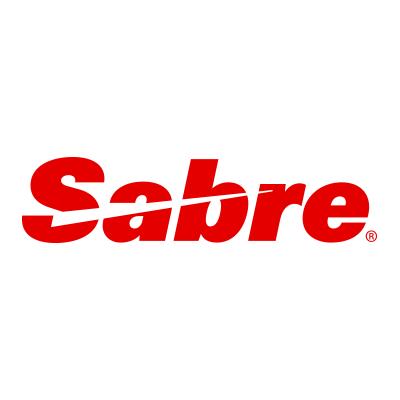PyData Trójmiasto #29

18:00 - 18:05 - Meeting boarding
18:05 - 18:10 - A few words about PyData
18:10 - 18:55 - Beyond the Continuum: The Importance of Quantization in Deep Learning by Adrian Boguszewski
18:55 - 19:40 - Building an in-the-wild gaze estimation solution by Cezary Polak
19:40 - Pizza & networking!
We are enormously happy to welcome you to our first event in 2024!!!
Where: Gdańsk Science and Technology Park, Building B, Room 002
When: 20th February 2024 at 18:00
Talk #1
Beyond the Continuum: The Importance of Quantization in Deep Learning
Quantization is a process of mapping continuous values to a finite set of discrete values. It is a powerful technique that can significantly reduce the memory footprint and computational requirements of deep learning models, making them more efficient and easier to deploy on resource-constrained devices. In this talk, we will explore the different types of quantization techniques and discuss how they can be applied to deep learning models. In addition, we will cover the basics of NNCF and OpenVINO Toolkit, seeing how they collaborate to achieve outstanding performance - everything in a Jupyter Notebook, which allows you to try it at home.
About Adrian Boguszewski:
Adrian is an AI Software Evangelist at Intel. He graduated 7 years ago from Informatics at Gdańsk University of Technology. Then his career in Computer Vision and Deep Learning has took off as team leader. Adrian was responsible for implementing in-home-use app allowing you to take a professional photo later used in ID or Passport just at home, without going out. He is the coauthor of LandCover.ai dataset, and creator of OpenCV Image Viewer Plugin, and gives lectures from time to time. At Intel he educates others on OpenVINO Toolkit capabilities. During his free time he travels and improves his financing / investing skills.
Talk #2
Building an in-the-wild gaze estimation solution
Problem: In my presentation, I would like to talk about our efforts to build a web-service-based AI-powered gaze estimation solution that can work using the video feed from the built-in user-facing camera of a mobile device, e.g. a phone. This can be used to tell where on the screen a user is looking at a given moment.
Methodology: Several different methodologies have been combined to solve this problem. We acquired thousands of user videos using a crowd-sourcing platform to build our training datasets. We are using deep learning models to estimate a coarse gaze vector, we further fine-tune it using a calibration procedure. In order to get to know camera intrinsics, we use auto-calibration techniques also based on deep learning. To extract information about the physical phone parameters, we combine databases that we acquired by purchase and computer vision algorithms to extract vital information.
Conclusions: We can achieve an average accuracy of about 13 mm across a wide range of conditions.
Implications: We are developing this solution to enable attention analysis research on content viewed by users on their mobile devices. However, the list of use cases can be expanded to other areas, e.g. smart vehicles.
About Cezary Polak:
Cezary Polak works as a Machine Learning Researcher at DAC.digital in Gdansk, Poland. He graduated from the Faculty of Electronics, Telecommunications, and Informatics at the Gdansk University of Technology. He is interested in using deep learning in biomedical engineering and also in generating synthetic data as photos and texts.






